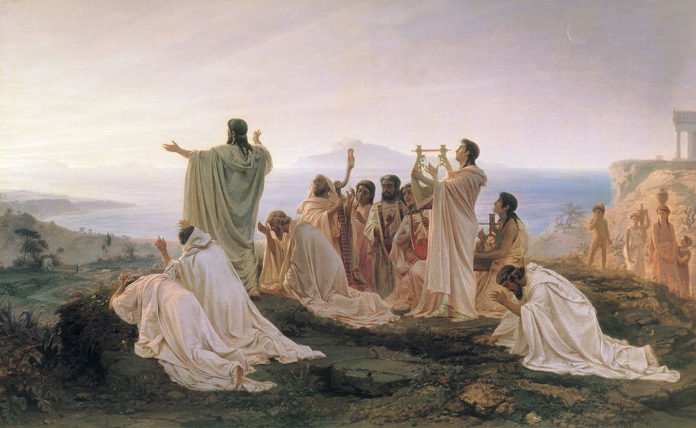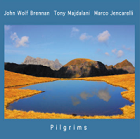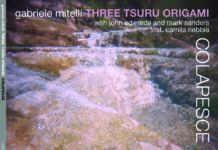
 After all, John Wolf Brennan has accustomed us to meetings between East and West: those who remember his masterpieces recorded long ago have always perceived his proximity to some aspects of non-Western thought, so maybe this new work does not surprise that much: basically it was born as a musical background for 7 short films by director Milos Savic, in which Brennan, accompanied by percussionist of Palestinian origin, Tony Majdalani, recorded 7 short musical meditations. Probably the two musicians were not happy with a format not extended, so they thought to complete the work by adding more songs and a guitarist (Mark Jencarelli in four tracks) to give the work a sense of accomplishment. “Pilgrims,” metaphorically pointing to the pilgrims of all kinds, as those who seek to reach an important goal in their lives (both geographical and spiritual, cultural and social), it is therefore a transversal musical journey that seeks to capture the fragrances of our personality, without any pressure from the side of virtue; with a wide instrumentation supported, a feeling “new age” inevitably surrounds us for a path that brings to mind what Brennan has always sought in his career ie musical adventures open to the instrumental breath and smells of the world; Brennan reintroduces instruments such as the Hohner melodica or Indian Harmonium, while Majdalani gives a wide range of percussion where you notice the presence of the Steel pan, the Hang or berimbao (in addition to his occasional and Middle Eastern evocative voice). In the long pages of the booklet which accompanies the CD there are many explanations of the music of three musicians and many statements of personality not only from the world of music: the mention of one of the most fascinating mysteries of creation, the golden ratio as a guide to the path of God (Brennan is one of the most sincere customers) and the theory of “Harmony of the spheres” of Pythagoras, are topics that deserve much more attention.
After all, John Wolf Brennan has accustomed us to meetings between East and West: those who remember his masterpieces recorded long ago have always perceived his proximity to some aspects of non-Western thought, so maybe this new work does not surprise that much: basically it was born as a musical background for 7 short films by director Milos Savic, in which Brennan, accompanied by percussionist of Palestinian origin, Tony Majdalani, recorded 7 short musical meditations. Probably the two musicians were not happy with a format not extended, so they thought to complete the work by adding more songs and a guitarist (Mark Jencarelli in four tracks) to give the work a sense of accomplishment. “Pilgrims,” metaphorically pointing to the pilgrims of all kinds, as those who seek to reach an important goal in their lives (both geographical and spiritual, cultural and social), it is therefore a transversal musical journey that seeks to capture the fragrances of our personality, without any pressure from the side of virtue; with a wide instrumentation supported, a feeling “new age” inevitably surrounds us for a path that brings to mind what Brennan has always sought in his career ie musical adventures open to the instrumental breath and smells of the world; Brennan reintroduces instruments such as the Hohner melodica or Indian Harmonium, while Majdalani gives a wide range of percussion where you notice the presence of the Steel pan, the Hang or berimbao (in addition to his occasional and Middle Eastern evocative voice). In the long pages of the booklet which accompanies the CD there are many explanations of the music of three musicians and many statements of personality not only from the world of music: the mention of one of the most fascinating mysteries of creation, the golden ratio as a guide to the path of God (Brennan is one of the most sincere customers) and the theory of “Harmony of the spheres” of Pythagoras, are topics that deserve much more attention.“Pilgrims” goes beyond a mere approach made to satisfy a request for work, instead it is the adherence to a model of philosophical thought, demonstrating that there is a common purpose that can bind all men, even those who are lost in the most unthinkable latitudes. Today a large part of music critics considers unfashionable these combinations of sounds, but this is a mistake, because good music knows no boundaries of time: new updates are always possible and welcome to our ears and “Pilgrims” is certainly part of them (listen to the delicacy of the musical fusions of “Thirsty Donkey”, “Bird on See-saw” or “The storyteller”).
_______________________________________________________________________________
Agli incontri tra Occidente ed Oriente John Wolf Brennan ci ha tutto sommato abituato: chi ricorda i suoi capolavori registrati tempo addietro si è da sempre accorto della sua vicinanza mentale ad alcuni aspetti non appartenenti al suo background di nascita, perciò forse questo suo nuovo “Pilgrims” non sorprenderà più di tanto: basicalmente nato come sfondo musicale per 7 cortometraggi del registra Milos Slavic, in compagnia del percussionista di origini palestinesi, Tony Majdalani, Brennan incide 7 brevi meditazioni musicali. Tuttavia, forse non contenti di un formato poco esteso, i due pensarono di completare l’opera aggiungendo altri brani e un chitarrista (Marco Jencarelli in quattro tracce) per dare al lavoro un senso più compiuto. “Pilgrims“, metaforicamente rivolto ai pellegrini intesi come coloro che cercano di raggiungere una mèta importante nella loro vita (sia geografica che spirituale, sia culturale che sociale), è quindi un viaggio musicale trasversale che cerca di cogliere le fragranze della nostra personalità, senza nessuna insistenza del lato delle virtù: con una ampia strumentazione di riferimento, un sentimento “new age” inevitabilmente vi aggredirà per un percorso che riporta alla mente quello che Brennan ha sempre cercato nella sua carriera, ossia avventure musicali aperte al respiro strumentale e ai profumi del mondo; questo lavoro in cui Brennan rispolvera strumenti come la melodica o l’Indian Harmonium, vede Majdalani da parte sua conferire un ampio impianto percussivo in cui lo Steel pan, l’Hang o il berimbao sono molto presenti (oltre alla sua saltuaria presenza della voce). Nelle lunghe pagine del libretto che accompagna il cd vi sono molte spiegazioni della musica dei tre e molte dichiarazioni di personalità non solo appartenenti al mondo musicale: viene menzionata uno dei misteri più affascinanti del mondo, la golden ratio come guida al sentiero di Dio (di cui Brennan è uno dei più sinceri avventori) e la teoria delle “Harmony of the spheres” di Pitagora, temi a cui sarebbe necessario riporre molta più attenzione.
“Pilgrims” quindi esula da un mero accostamento fatto per soddisfare una richiesta di lavoro, poichè diventa ad un certo punto espressione di un pensiero ben preciso, quello di una comunione di intenti che potrebbe legare tutti gli uomini anche alle più impensabili latitudini. Oggi gran parte della critica musicale ritiene fuori moda queste combinazioni di suoni, ma questo è un errore, perché la buona musica non conosce confini di tempo: i nuovi aggiornamenti sono sempre possibili e benvenuti alle nostre orecchie e “Pilgrims” è certamente parte di loro (ascoltare la delicatezza delle fusioni musicali di “Donkey Thirsty“, “Bird on See-saw” o “The storyteller“)






